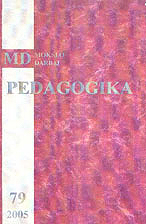Peer-group-based Relationships Among Junior High School Students in Their Parents’ Opinions
Peer-group-based Relationships Among Junior High Shool Students in Their Parents’ Opinions
Author(s): Danuta KowalczykSubject(s): Education
Published by: Vytauto Didžiojo Universitetas
Keywords: peer group; junior high school students; peer-group relationships; socialization; parents; educational influence
Summary/Abstract: The experience of children and youth participating in the peer group can take a different educational dimension, especially as the present civilization has created a possibility to open new contacts by means of modern technological media. Contemporary family is going through a crisis, which results from deep social changes. This, obviously, affects its rearing function and leads to occurrence of negative effects. Therefore, the intention behind the present work was to find out about schoolchildren’s parents’ opinions on the peer-group-based relationships among students of junior high school. According to the new structure of the school system, learning at middle school lasts 3 years and concerns students from 13 to 16 years of age. The subject matter of the present research are both problems related to parents’ knowledge of the functioning of students of middle school in the peer group environment and assessment of the role the latter plays in the rearing process. The empirical verification was carried out by means of the diagnostic survey method with the use of the technique of interview. The survey covered parents of students attending junior high schools. The obtained research material points to the fact that, generally, parents of middle school students are familiar with their children’s peer-group-related contacts since they endeavor to get to know the children’s friends personally. Mothers appear to be more involved in the rearing process and therefore they know more about their children’s mates more than fathers. Parents are aware of the growing role of the peer group in the time of their children’s growing up and try to control the latter in this respect. The greatest source of parental concern in the possibility of a destructive impact the peer group can have on individual youth, which can manifest itself in developing a-social forms of behavior. However, the majority of parents declare leaving considerable freedom to their children as regards choosing friends. There is a view dominating among parents that teenagers need to keep contacts with their peers since this has a positive influence on the process of their socialization. Parents who experience problems with rearing their children tend to express the opposite opinion. In the light of the problem situation they come to face they tend to see the causes of misbehavior of the young in their relationships with the peer group. They assess the role of the peer-group-related environment as a definitely negative one
Journal: Pedagogika
- Issue Year: 2005
- Issue No: 79
- Page Range: 174-179
- Page Count: 7
- Language: English

